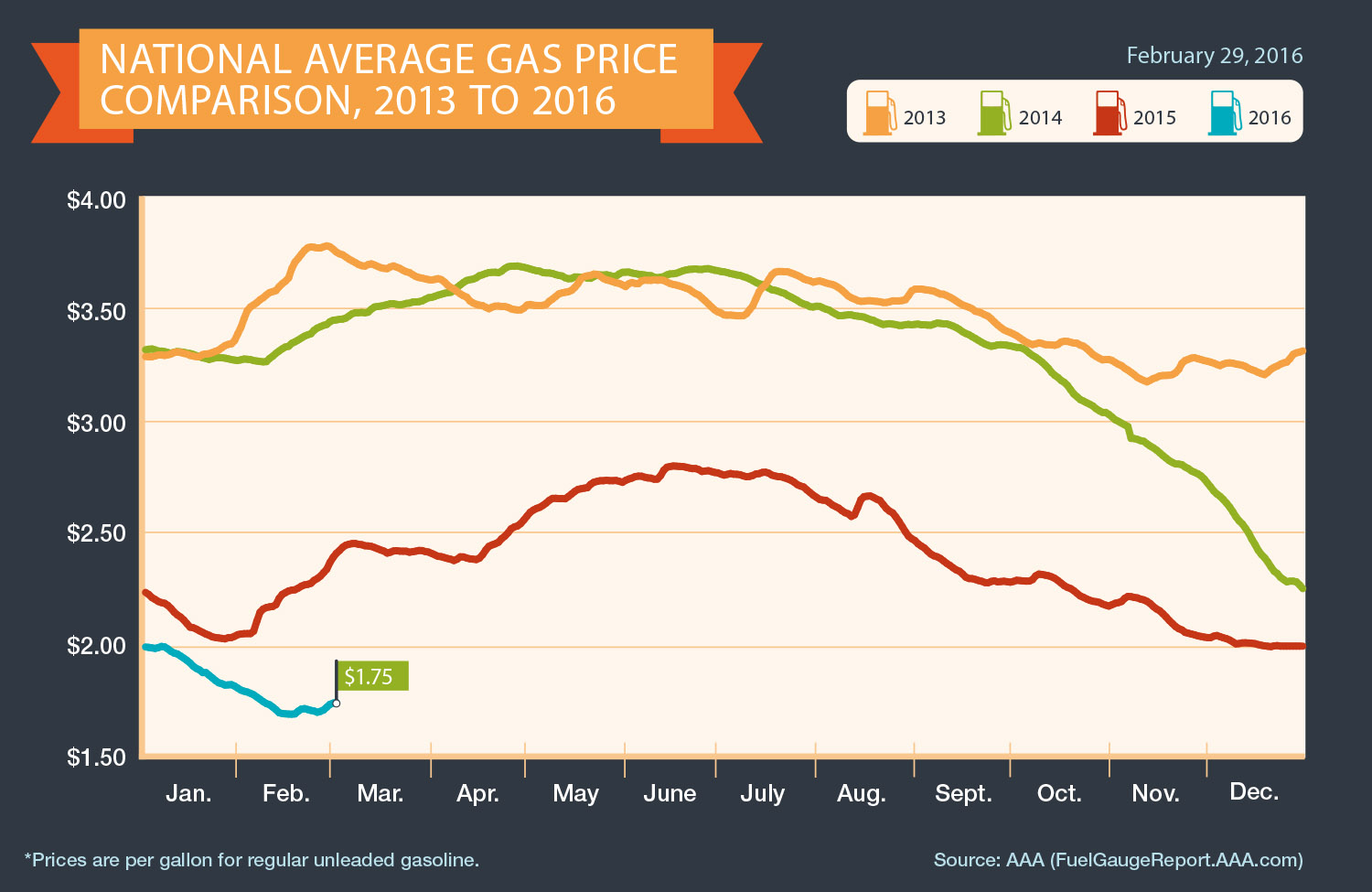(WASHINGTON, February 29, 2016) The national average price of gas has increased for six consecutive days for the first time since early November, though drivers continue to enjoy relatively low prices at the pump. Gas prices have climbed by four cents per gallon versus one week ago and are likely to continue to rise as the spring refinery maintenance season ramps up. Monthly and yearly savings persist and drivers are saving five cents on the month and 65 cents on the year.
Gas prices are moving higher in many parts of the country as refinery maintenance season gets underway and as some refineries cut production in response to abundant supplies. Swings in gas prices at the regional level are typical for this time of year as many refineries conduct maintenance in advance of the busy summer driving season. Despite these seasonal increases, abundant gasoline supplies and lower crude oil costs should keep gas prices from rising as high as drivers have seen in recent years.
Hawaii ($2.56) is the nation’s most expensive market for retail gasoline, and regional neighbors California ($2.39), Alaska ($2.20), and Washington ($2.03) are the only states with averages above $2 per gallon. Pump prices in the majority of states (31) are at or below the $1.75 per gallon and consumers in Arizona ($1.52), Tennessee ($1.53) and South Carolina ($1.53) are paying the nation’s lowest averages at the pump.
Gas prices are relatively steady and have moved by +/- 3 cents per gallon in 30 states and Washington, D.C. week-over-week. Typical for this time of year, gas prices are quickly moving higher in some markets. Prices climbed higher by double digits on the week in 10 states with the largest price jumps in Iowa (+18 cents), Oklahoma (+18 cents) and Minnesota (+17 cents). Outside of this trend of weekly increases, drivers in 20 states and Washington, D.C. are paying less to refuel their vehicles versus one week ago. Prices have fallen in less dramatic fashion in these states, and Arizona (-5 cents) is the only state where gas prices are down a nickel per gallon week-over-week.
Gas prices are down in 36 states and Washington, D.C. over the month, with the largest monthly savings west of the Rockies in Arizona (-31 cents), Nevada (-29 cents) and Alaska (-25 cents). Drivers in 14 states are paying more at the pump versus one month ago, and prices are up by a dime or more per gallon in the Midwestern states of Minnesota (+16 cents), Oklahoma (+13 cents), Iowa (+11 cents), Ohio (+11 cents) and Illinois (+10 cents).
Gas prices in nearly every state (49) and Washington, D.C., are discounted by more than a quarter per gallon, and drivers in 43 states are saving 50 cents or more per gallon on the year. California (-93 cents), Arizona (-86 cents), Oregon (-80 cents) and Nevada (-75 cents) are posting the largest yearly discounts at the pump.
Global crude oil supply remains front of mind and the price of oil continues to swing in response to shifting expectations of future supply and demand. The world’s top oil producing nations recently have considered potential agreements that would freeze production levels to stabilize prices. Despite these discussions, many of these countries rely on oil profits to finance national operations and social programs, and thus any agreement faces significant headwinds as countries look to fill budget deficits by producing oil at higher levels. Both global benchmarks, Brent and West Texas Intermediate, managed to post weekly gains, though market fundamentals continue to point to abundant supplies.
At the close of Friday’s formal trading session on the NYMEX, WTI was down 29 cents and settled at $32.78 per barrel. This price point represents a weekly gain of more than $3 per barrel.
Motorists can find current gas prices along their route with the free AAA Mobile app for iPhone, iPad and Android. The app can also be used to map a route, find discounts, book a hotel and access AAA roadside assistance. Learn more at AAA.com/mobile.



